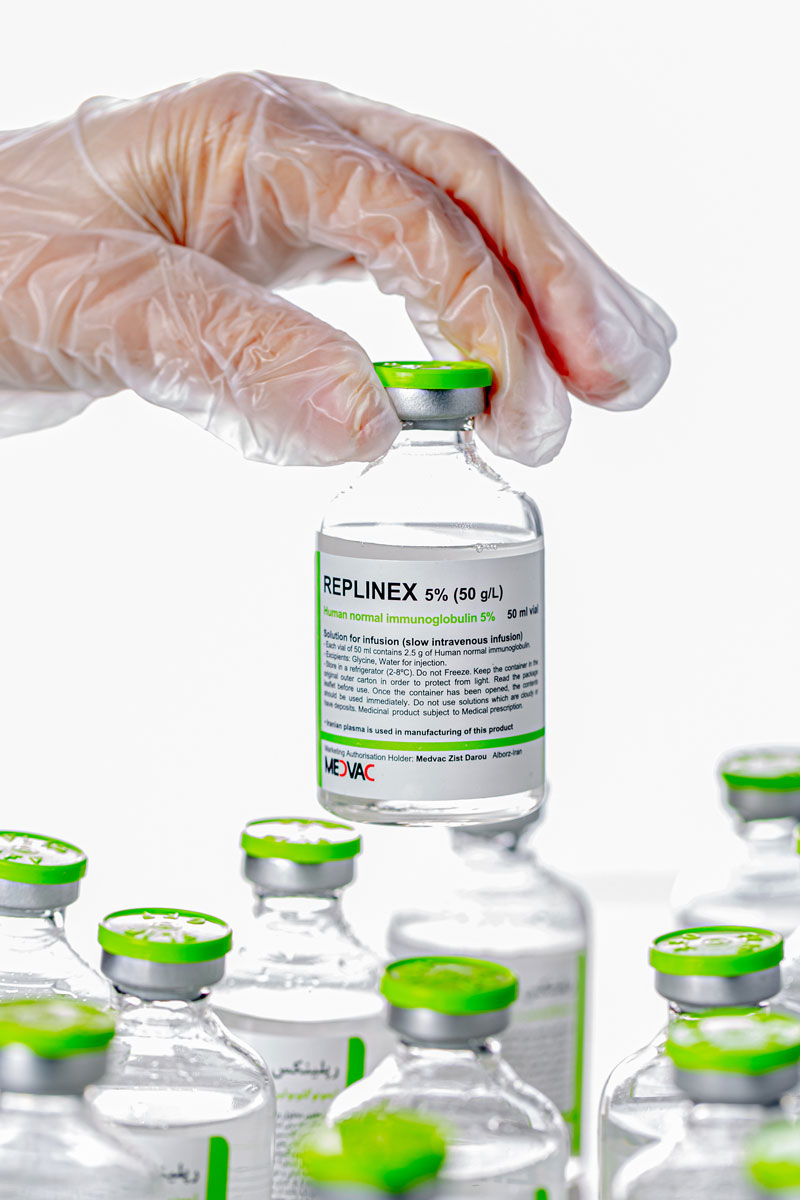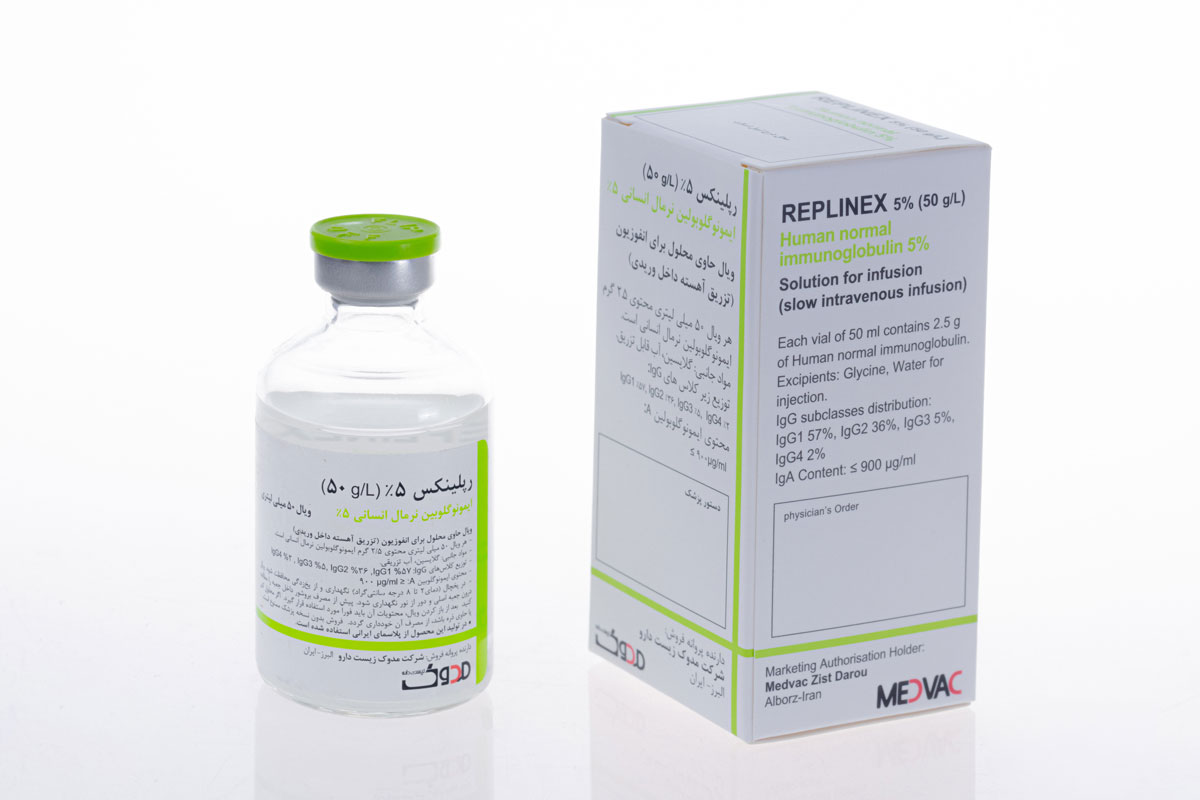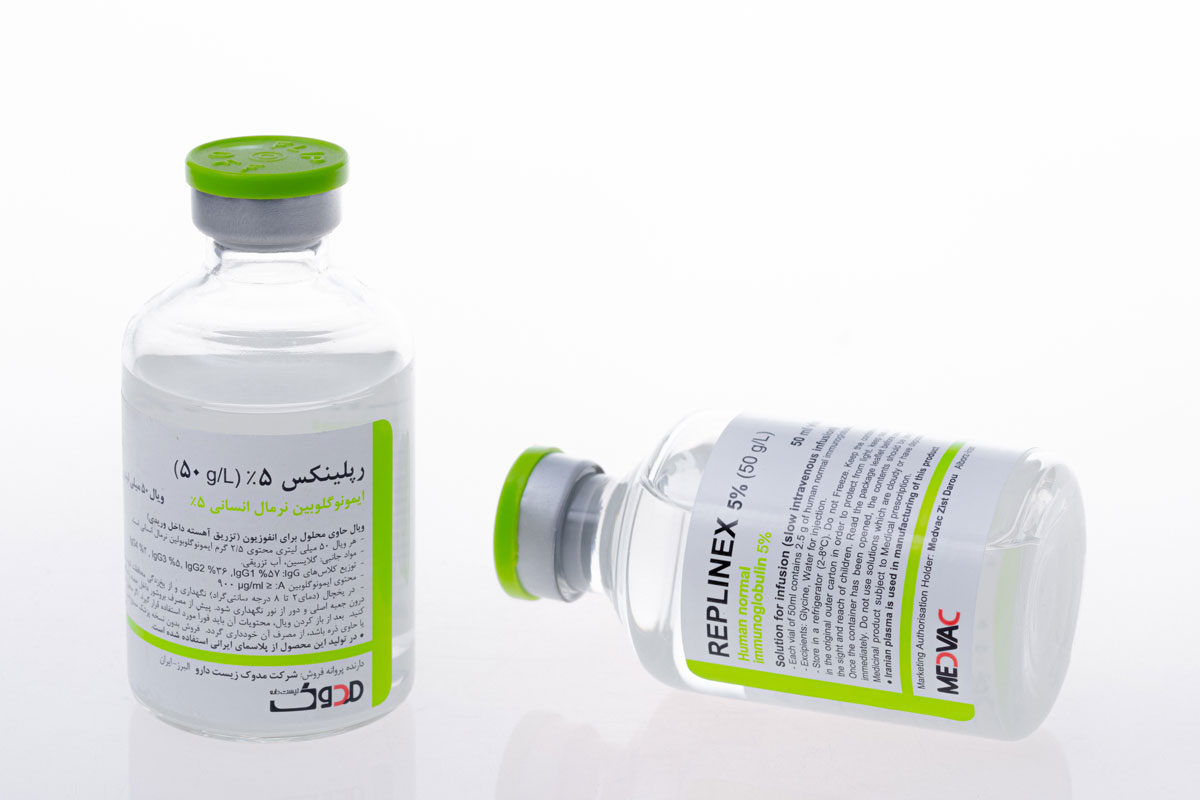Replinex
Intravenous Immune Globulin


Patient Drug Information
Warning
- The chance of blood clots may be raised with this drug. The chance may be higher in older people, if you have to be in a bed or chair for a long time, if you take estrogen products, or if you have certain catheters. Some health problems like thick blood, heart problems, or a history of blood clots raise the chance of having blood clots. Blood clots can happen if you do not have any of these health problems. Call your doctor right away if you have numbness or weakness on 1 side of your body; pain, redness, tenderness, warmth, or swelling in the arms or legs; change in color of an arm or leg; chest pain or pressure; shortness of breath; fast heartbeat; or coughing up blood. Talk with your doctor.
- Very bad and sometimes deadly kidney problems have happened with human immune globulin products. Kidney problems are more common in people using products that have sucrose. The chance may be raised if you have kidney problems, high blood sugar (diabetes), fluid loss (dehydration) or low blood volume, a blood infection, or proteins in the blood that are not normal. The chance may also be raised if you are 65 or older, or if you take other drugs that may harm the kidneys. Talk with your doctor.
- You will need to be sure that you are not dehydrated before getting this drug. Check with your doctor to see if you need to drink extra fluids before getting this drug.




What is this drug used for?
- It is used to stop or lower the harshness of other infections in people with a weak immune system.
- It is used to treat immune thrombocytopenia (ITP).
- It is used treat chronic inflammatory demyelinating polyneuropathy (CIDP).
- It is used to stop or lower the harshness of infection by hepatitis A, measles, chickenpox (varicella), and rubella.
- It is used to treat multifocal muscle neuropathy.
- It is used to treat Kawasaki disease.
- It may be given to you for other reasons. Talk with the doctor.
Patient Drug Information
Warning
- The chance of blood clots may be raised with this drug. The chance may be higher in older people, if you have to be in a bed or chair for a long time, if you take estrogen products, or if you have certain catheters. Some health problems like thick blood, heart problems, or a history of blood clots raise the chance of having blood clots. Blood clots can happen if you do not have any of these health problems. Call your doctor right away if you have numbness or weakness on 1 side of your body; pain, redness, tenderness, warmth, or swelling in the arms or legs; change in color of an arm or leg; chest pain or pressure; shortness of breath; fast heartbeat; or coughing up blood. Talk with your doctor.
- Very bad and sometimes deadly kidney problems have happened with human immune globulin products. Kidney problems are more common in people using products that have sucrose. The chance may be raised if you have kidney problems, high blood sugar (diabetes), fluid loss (dehydration) or low blood volume, a blood infection, or proteins in the blood that are not normal. The chance may also be raised if you are 65 or older, or if you take other drugs that may harm the kidneys. Talk with your doctor.
- You will need to be sure that you are not dehydrated before getting this drug. Check with your doctor to see if you need to drink extra fluids before getting this drug.




What do I need to tell my doctor BEFORE I take this drug?
- All products:
- If you have an allergy to immune globulin or any other part of this drug.
- If you are allergic to any drugs like this one, any other drugs, foods, or other substances. Tell your doctor about the allergy and what signs you had, like rash; hives; itching; shortness of breath; wheezing; cough; swelling of face, lips, tongue, or throat; or any other signs.
- If you have IgA deficiency.
- If you have too much proline in your blood (hyperprolinemia).
- Injection (if given into the fatty part of the skin or a muscle):
- If you have low platelet levels.
- Injection (I.V.):
- If you are not able to break down fructose, talk with the doctor. Some of these products have sorbitol.
- Children:
- If the patient is an infant or baby and it is not known if they are able to break down sucrose or fructose. Do not give this drug to your child if this is the case.
- This is not a list of all drugs or health problems that interact with this drug.
- Tell your doctor and pharmacist about all of your drugs (prescription or OTC, natural products, vitamins) and health problems. You must check to make sure that it is safe for you to take this drug with all of your drugs and health problems. Do not start, stop, or change the dose of any drug without checking with your doctor.
What are some things I need to know or do while I take this drug?
- All products:
- Tell all of your health care providers that you take this drug. This includes your doctors, nurses, pharmacists, and dentists.
- If you have a latex allergy, talk with your doctor.
- Talk with your doctor before getting any vaccines. Use with this drug may either raise the chance of an infection or make the vaccine not work as well.
- Have blood work checked as you have been told by the doctor. Talk with the doctor.
- This drug may affect certain lab tests. Tell all of your health care providers and lab workers that you take this drug.
- This drug is made from human plasma (part of the blood) and may have viruses that may cause disease. This drug is screened, tested, and treated to lower the chance that it carries an infection. Talk with the doctor.
- If you are 65 or older, use this drug with care. You could have more side effects.
- Tell your doctor if you are pregnant or plan on getting pregnant. You will need to talk about the benefits and risks of using this drug while you are pregnant.
- Tell your doctor if you are breast-feeding. You will need to talk about any risks to your baby.
- Injection (I.V.):
- If you are on a low-sodium or sodium-free diet, talk with your doctor. Some of these products have sodium.
- If you have high blood sugar (diabetes), talk with your doctor about which glucose tests are best to use.
- Some patients who have immune globulin therapy for the first time or who have not had it within the past 8 weeks may have a risk for certain side effects. These may be fever, chills, nausea, or vomiting. This may also happen in people who switch brands of immune globulin. Tell the doctor right away if any of these side effects occur.
What are some side effects that I need to call my doctor about right away?
- WARNING/CAUTION:Even though it may be rare, some people may have very bad and sometimes deadly side effects when taking a drug. Tell your doctor or get medical help right away if you have any of the following signs or symptoms that may be related to a very bad side effect:
- All products:
- Signs of an allergic reaction, like rash; hives; itching; red, swollen, blistered, or peeling skin with or without fever; wheezing; tightness in the chest or throat; trouble breathing, swallowing, or talking; unusual hoarseness; or swelling of the mouth, face, lips, tongue, or throat.
- Injection (I.V.):
- Signs of kidney problems like unable to pass urine, change in how much urine is passed, blood in the urine, or a big weight gain.
- Signs of high or low blood pressure like very bad headache or dizziness, passing out, change in eyesight.
- Fever or chills.
- Change in color of skin to a bluish color like on the lips, nail beds, fingers, or toes.
- Feeling very tired or weak.
- Feeling confused.
- A heartbeat that does not feel normal.
- Any unexplained bruising or bleeding.
- Mood changes.
- Muscle or joint pain.
- Change in speech.
- Change in eyesight.
- Blurred eyesight.
- Sweating a lot.
- Very bad belly pain.
- Dark urine or yellow skin or eyes.
- Very bad irritation where the shot was given.
- Lung problems have happened with this drug. Call your doctor right away if you have lung or breathing problems like trouble breathing, shortness of breath, or a cough that is new or worse.
- This drug may raise the chance of a very bad brain problem called aseptic meningitis. Call your doctor right away if you have a headache, fever, chills, very upset stomach or throwing up, stiff neck, rash, bright lights bother your eyes, feeling sleepy, or feeling confused.


What are some other side effects of this drug?
- All drugs may cause side effects. However, many people have no side effects or only have minor side effects. Call your doctor or get medical help if any of these side effects or any other side effects bother you or do not go away:
- All products:
- Irritation where this drug is given.
- All other injection products (I.V. and subcutaneous):
- Loose stools (diarrhea).
- Feeling tired or weak.
- Back pain.
- Sore throat.
- Runny nose.
- Stuffy nose.
- Upset stomach or throwing up.
- Belly pain.
- These are not all of the side effects that may occur. If you have questions about side effects, call your doctor. Call your doctor for medical advice about side effects.
- You may report side effects to your national health agency.
How is this drug best taken?
- Use this drug as ordered by your doctor. Read all information given to you. Follow all instructions closely.
- Injection (I.V.):
- It is given as an infusion into a vein over a period of time.
What do I do if I miss a dose?
- Call your doctor to find out what to do.
How do I store and/or throw out this drug?
- Injection (I.V.):
- If you need to store this drug at home, talk with your doctor, nurse, or pharmacist about how to store it.
- All products:
- Keep all drugs in a safe place. Keep all drugs out of the reach of children and pets.
- Throw away unused or expired drugs. Do not flush down a toilet or pour down a drain unless you are told to do so. Check with your pharmacist if you have questions about the best way to throw out drugs. There may be drug take-back programs in your area.


General drug facts
- If your symptoms or health problems do not get better or if they become worse, call your doctor.
- Do not share your drugs with others and do not take anyone else's drugs.
- Keep a list of all your drugs (prescription, natural products, vitamins, OTC) with you. Give this list to your doctor.
- Talk with the doctor before starting any new drug, including prescription or OTC, natural products, or vitamins.
- Some drugs may have another patient information leaflet. If you have any questions about this drug, please talk with your doctor, nurse, pharmacist, or other health care provider.
- If you think there has been an overdose, call your poison control center or get medical care right away. Be ready to tell or show what was taken, how much, and when it happened.


























بدون دیدگاه